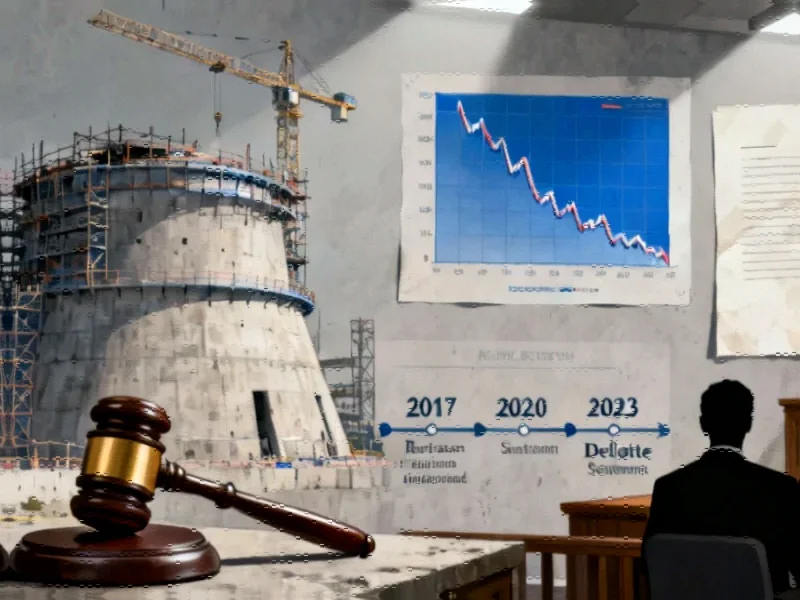Auditing Under Scrutiny: The Deloitte Settlement
Deloitte has agreed to pay $34 million to resolve claims that its audit work failed to detect warning signs in one of America’s most significant nuclear power project failures. This substantial settlement represents one of the largest securities class action recoveries from an auditing firm in the past decade and highlights growing scrutiny of auditor responsibility in major infrastructure projects.
The case centers on Deloitte’s audit work for Scana Corporation, a South Carolina utility that abandoned construction of two nuclear reactors in 2017 after years of problems and cost overruns. Shareholders alleged that Deloitte repeatedly signed off on financial statements that misleadingly suggested the project would be completed on time, despite numerous red flags that should have been detected during audit procedures.
The Collapse of a Nuclear Ambition
When Scana ultimately abandoned the nuclear project, the consequences were severe and far-reaching. The company’s stock price plummeted, leading to its cut-price sale to Dominion Energy. The fallout extended beyond financial markets, resulting in criminal charges against Scana’s former chief executive, who pleaded guilty to misleading regulators about the project’s progress.
The nuclear fiasco also had significant industry-wide implications, contributing to the bankruptcy of Westinghouse Electric Company, the construction firm overseeing reactor development. This cascade of failures underscores how major infrastructure projects can create ripple effects throughout multiple sectors when proper oversight mechanisms fail.
Legal Landscape for Auditor Liability
This settlement is particularly noteworthy given the high legal threshold for holding auditors accountable for client misconduct. Under securities law, audit opinions are intended to provide only “reasonable assurance” rather than absolute guarantees of financial statement accuracy. The $34 million recovery stands among the most substantial auditor settlements in recent history, surpassed only by PwC’s $65 million payment in 2015 related to the MF Global collapse.
Plaintiff attorneys described the settlement as an “excellent result” achieved after extensive litigation and mediation. The agreement comes in addition to a separate $192.5 million settlement reached with Scana and its officers in 2020, providing investors with meaningful recovery for their losses estimated at $800 million.
Whistleblower Warnings Ignored
Court documents reveal that Deloitte dismissed early warnings from a Scana whistleblower who raised concerns as early as 2015 about the project’s timeline. The whistleblower specifically warned that the reactors would not be completed in time to qualify for critical government subsidies, information that proved accurate when the project ultimately collapsed.
In a damaging internal assessment, one of Deloitte’s own construction experts conducted a post-mortem review and authored a six-page handwritten memo concluding the firm should have more thoroughly investigated the whistleblower’s claims. This internal critique highlights ongoing regulatory compliance challenges facing professional services firms across multiple industries.
Industry Implications and Future Oversight
The settlement arrives amid broader financial industry developments that are reshaping professional accountability standards. While Deloitte maintains that its settlement doesn’t constitute an admission of liability and that it stands behind its audit work, the case nonetheless establishes an important precedent for auditor responsibility in major capital projects.
The nuclear sector faces particular challenges, as evidenced by global energy transitions affecting multiple industries. Meanwhile, technological advancements are creating new opportunities for audit innovation and improved oversight mechanisms.
As professional services firms navigate this evolving landscape, the Deloitte settlement serves as a stark reminder of the critical role auditors play in maintaining market confidence. The case also intersects with broader regulatory and governance discussions happening across multiple sectors, highlighting how legal and compliance frameworks continue to adapt to complex business environments.
Looking forward, the industry is watching how emerging technologies might transform audit methodologies and early warning systems. The settlement underscores the continuing tension between the professional judgment expected of auditors and the practical limitations of audit procedures in detecting sophisticated concealment of problems by client management.
The settlement awaits final approval from a South Carolina federal judge, but its impact on audit standards and professional liability is already resonating throughout the accounting profession and beyond.
This article aggregates information from publicly available sources. All trademarks and copyrights belong to their respective owners.
Note: Featured image is for illustrative purposes only and does not represent any specific product, service, or entity mentioned in this article.



